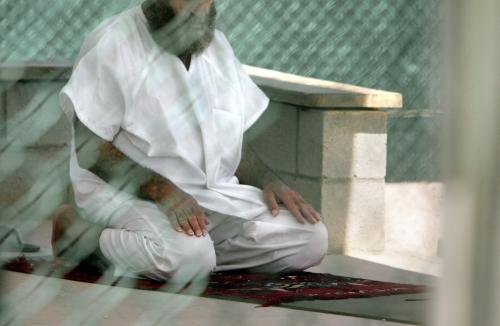Sens. Lindsey Graham and John McCain were quick out of the box last night in declaring that the Obama administration should hold Dzhokar Tsarnaev in military detention for his role in the Boston bombing:
Now that the suspect is in custody, the last thing we should want is for him to remain silent. It is absolutely vital the suspect be questioned for intelligence gathering purposes. We need to know about any possible future attacks which could take additional American lives. The least of our worries is a criminal trial which will likely be held years from now.
Under the Law of War we can hold this suspect as a potential enemy combatant not entitled to Miranda warnings or the appointment of counsel. Our goal at this critical juncture should be to gather intelligence and protect our nation from further attacks.
We remain under threat from radical Islam and we hope the Obama Administration will seriously consider the enemy combatant option.
We will stand behind the Administration if they decide to hold this suspect as an enemy combatant.
Bobby quickly explained why this is both unnecessary and a bad idea; this very fine Wall Street Journal blog sketches out why it would pose legal problems as well. But the idea has had legs on Twitter, so I want to bring together in one place and explain the several distinct but overlapping reasons why it would be not merely ill-advised but absolutely nuts to try to treat Tsarnaev as an enemy combatant.
Broadly speaking, there are four reasons:
First and most important, Tsarnaev may not be an enemy combatant. Graham and McCain warn that “The accused perpetrators of these acts were not common criminals attempting to profit from a criminal enterprise, but terrorists trying to injure, maim, and kill innocent Americans.” That’s certainly true. But not every terrorist with a bomb is an enemy combatant whose military detention is authorized by law. Some are just killers with bombs. Under the AUMF as interpreted by the courts, and under the NDAA as passed by Congress, the administration is authorized to hold in military detention only those who are “part of” or “substantially supporting” Al Qaeda, the Taliban, or associated forces. Nothing that has come to light publicly has shown that Tsarnaev was operating as part of any group covered by the AUMF. Unless and until such evidence arises, military detention is not merely a bad idea. It is simply not legally available. Particularly for those of us who support military detention in appropriate circumstances and have argued for its propriety and legality, it is absolutely essential to reject it where the facts do not support it. Military detention does not flow legally from the fact of someone’s being more than just a common criminal. It flows from the fact of someone’s being a part of a military enemy’s fighting cadre. Calling for detention of people who don’t meet—or may not meet—that threshold comes perilously close to calling for a roving power to lock up nasty people.
Second, assuming for a moment that the facts as they emerge would support an enemy combatant designation, there’s the small matter of Tsarnaev’s citizenship. Tsarnaev is reportedly a naturalized American citizen, and the government’s appetite for the detention of American citizens under the laws of war has waned—and rightly so. This began under the Bush administration, which tried twice—in the early cases of Yaser Hamdi and Jose Padilla—to detain U.S. citizens under the laws of war and ultimately backed down both times. The question of whether such detention is legally appropriate for a U.S. citizen captured by law enforcement remains an open one. But it’s an open question that no sane executive would want to test in the presence of a viable alternative—like, say, an open-and-shut prosecution in federal court. As a matter of policy, it was informally off the table long ago, and the Obama administration made that informal policy formal. John Brennan, in a speech at Harvard Law School, declared:
when it comes to U.S. citizens involved in terrorist-related activity, whether they are captured overseas or at home, we will prosecute them in our criminal justice system. There is bipartisan agreement that U.S. citizens should not be tried by military commission.
Third, even if the reports of Tsarnaev’s citizenship prove erroneous, he was certainly captured in the United States, and the military detention of domestic captures is problematic for many of the same reasons that the detention of the citizen poses difficulties. Again, whether it is or is not legally available is an open question of law; this was the issue in the Al Marri case. But this is not a question of law that any administration should be eager to test. And just as it has adopted a policy of not testing the citizen detention question, the Obama administration has taken military detention off the table for domestic captures. As Brennan put it,
it is the firm position of the Obama Administration that suspected terrorists arrested inside the United States will—in keeping with long-standing tradition—be processed through our Article III courts. As they should be. Our military does not patrol our streets or enforce our laws—nor should it.
Fourth, even if all of these legal and policy problems could be overcome, as Bobby explained last night, military detention offers no clear advantages in this case and has several big disadvantages. The public safety exception to Miranda means the FBI has a considerable degree of flexibility in conducting this interrogation, so there’s no particular reason to expect the Bureau will be unable to glean from Tsarnaev the answers to the critical questions at stake right now: Are there accomplices still at large, and to what extent was the bombing the work of any foreign group? On the other hand, military detention would gravely complicate the longer-term interest in punishment and in Tsarnaev’s legitimate long-term incarceration. In the Hamdi and Padilla and Al Marri cases, the consequence of military detention was a substantially shorter sentence than the suspect’s conduct would have supported.
In short, there is simply no case for military detention here. By pushing for it, Sens. Graham and McCain risk bringing into disrepute the one avenue realistically open to those who want answers and justice.
***
This was reposted from Lawfare, where Wittes and others have been following the situation surrounding the Boston bombing. You can read more on the
Lawfare Blog
»
The Brookings Institution is committed to quality, independence, and impact.
We are supported by a diverse array of funders. In line with our values and policies, each Brookings publication represents the sole views of its author(s).






Commentary
Four Reasons Sens. Graham and McCain are Wrong about Military Detention for Dzhokar Tsarnaev
April 20, 2013